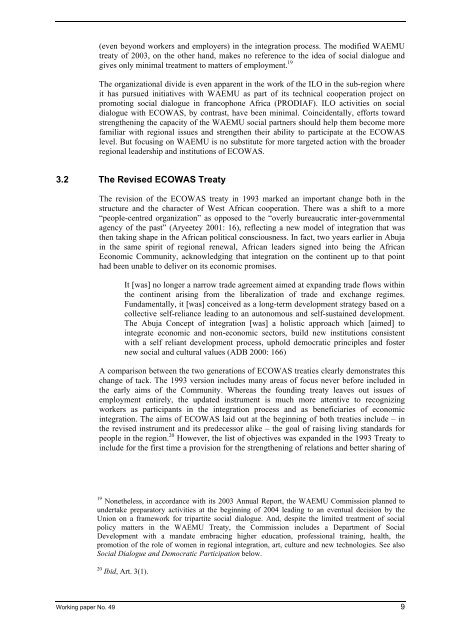The Social Dimension of Regional Integration in ECOWAS
The Social Dimension of Regional Integration in ECOWAS
The Social Dimension of Regional Integration in ECOWAS
Create successful ePaper yourself
Turn your PDF publications into a flip-book with our unique Google optimized e-Paper software.
(even beyond workers and employers) <strong>in</strong> the <strong>in</strong>tegration process. <strong>The</strong> modified WAEMU<br />
treaty <strong>of</strong> 2003, on the other hand, makes no reference to the idea <strong>of</strong> social dialogue and<br />
gives only m<strong>in</strong>imal treatment to matters <strong>of</strong> employment. 19<br />
<strong>The</strong> organizational divide is even apparent <strong>in</strong> the work <strong>of</strong> the ILO <strong>in</strong> the sub-region where<br />
it has pursued <strong>in</strong>itiatives with WAEMU as part <strong>of</strong> its technical cooperation project on<br />
promot<strong>in</strong>g social dialogue <strong>in</strong> francophone Africa (PRODIAF). ILO activities on social<br />
dialogue with <strong>ECOWAS</strong>, by contrast, have been m<strong>in</strong>imal. Co<strong>in</strong>cidentally, efforts toward<br />
strengthen<strong>in</strong>g the capacity <strong>of</strong> the WAEMU social partners should help them become more<br />
familiar with regional issues and strengthen their ability to participate at the <strong>ECOWAS</strong><br />
level. But focus<strong>in</strong>g on WAEMU is no substitute for more targeted action with the broader<br />
regional leadership and <strong>in</strong>stitutions <strong>of</strong> <strong>ECOWAS</strong>.<br />
3.2 <strong>The</strong> Revised <strong>ECOWAS</strong> Treaty<br />
<strong>The</strong> revision <strong>of</strong> the <strong>ECOWAS</strong> treaty <strong>in</strong> 1993 marked an important change both <strong>in</strong> the<br />
structure and the character <strong>of</strong> West African cooperation. <strong>The</strong>re was a shift to a more<br />
“people-centred organization” as opposed to the “overly bureaucratic <strong>in</strong>ter-governmental<br />
agency <strong>of</strong> the past” (Aryeetey 2001: 16), reflect<strong>in</strong>g a new model <strong>of</strong> <strong>in</strong>tegration that was<br />
then tak<strong>in</strong>g shape <strong>in</strong> the African political consciousness. In fact, two years earlier <strong>in</strong> Abuja<br />
<strong>in</strong> the same spirit <strong>of</strong> regional renewal, African leaders signed <strong>in</strong>to be<strong>in</strong>g the African<br />
Economic Community, acknowledg<strong>in</strong>g that <strong>in</strong>tegration on the cont<strong>in</strong>ent up to that po<strong>in</strong>t<br />
had been unable to deliver on its economic promises.<br />
It [was] no longer a narrow trade agreement aimed at expand<strong>in</strong>g trade flows with<strong>in</strong><br />
the cont<strong>in</strong>ent aris<strong>in</strong>g from the liberalization <strong>of</strong> trade and exchange regimes.<br />
Fundamentally, it [was] conceived as a long-term development strategy based on a<br />
collective self-reliance lead<strong>in</strong>g to an autonomous and self-susta<strong>in</strong>ed development.<br />
<strong>The</strong> Abuja Concept <strong>of</strong> <strong>in</strong>tegration [was] a holistic approach which [aimed] to<br />
<strong>in</strong>tegrate economic and non-economic sectors, build new <strong>in</strong>stitutions consistent<br />
with a self reliant development process, uphold democratic pr<strong>in</strong>ciples and foster<br />
new social and cultural values (ADB 2000: 166)<br />
A comparison between the two generations <strong>of</strong> <strong>ECOWAS</strong> treaties clearly demonstrates this<br />
change <strong>of</strong> tack. <strong>The</strong> 1993 version <strong>in</strong>cludes many areas <strong>of</strong> focus never before <strong>in</strong>cluded <strong>in</strong><br />
the early aims <strong>of</strong> the Community. Whereas the found<strong>in</strong>g treaty leaves out issues <strong>of</strong><br />
employment entirely, the updated <strong>in</strong>strument is much more attentive to recogniz<strong>in</strong>g<br />
workers as participants <strong>in</strong> the <strong>in</strong>tegration process and as beneficiaries <strong>of</strong> economic<br />
<strong>in</strong>tegration. <strong>The</strong> aims <strong>of</strong> <strong>ECOWAS</strong> laid out at the beg<strong>in</strong>n<strong>in</strong>g <strong>of</strong> both treaties <strong>in</strong>clude – <strong>in</strong><br />
the revised <strong>in</strong>strument and its predecessor alike – the goal <strong>of</strong> rais<strong>in</strong>g liv<strong>in</strong>g standards for<br />
people <strong>in</strong> the region. 20 However, the list <strong>of</strong> objectives was expanded <strong>in</strong> the 1993 Treaty to<br />
<strong>in</strong>clude for the first time a provision for the strengthen<strong>in</strong>g <strong>of</strong> relations and better shar<strong>in</strong>g <strong>of</strong><br />
19 Nonetheless, <strong>in</strong> accordance with its 2003 Annual Report, the WAEMU Commission planned to<br />
undertake preparatory activities at the beg<strong>in</strong>n<strong>in</strong>g <strong>of</strong> 2004 lead<strong>in</strong>g to an eventual decision by the<br />
Union on a framework for tripartite social dialogue. And, despite the limited treatment <strong>of</strong> social<br />
policy matters <strong>in</strong> the WAEMU Treaty, the Commission <strong>in</strong>cludes a Department <strong>of</strong> <strong>Social</strong><br />
Development with a mandate embrac<strong>in</strong>g higher education, pr<strong>of</strong>essional tra<strong>in</strong><strong>in</strong>g, health, the<br />
promotion <strong>of</strong> the role <strong>of</strong> women <strong>in</strong> regional <strong>in</strong>tegration, art, culture and new technologies. See also<br />
<strong>Social</strong> Dialogue and Democratic Participation below.<br />
20 Ibid, Art. 3(1).<br />
Work<strong>in</strong>g paper No. 49 9

















